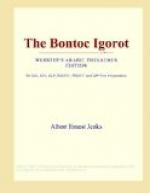The conditions presented above are practically the only ones in which the property owner controls the disposition of his possessions which pass in gift to kin.
The laws of inheritance and bequest are as firmly fixed as are the customs of giving and not giving during life.
Since all the property of a husband and wife is individual, except that accumulated by the joint efforts of the two during union, the property of each is divided on death. The survivor of a matrimonial union receives no share of the individual property of the deceased if there are kin. It goes first to the children or grandchildren. If there are none and a parent survives, it goes to the parent. If there are neither children, grandchildren, nor parents it goes to brothers and sisters or their children. If there are none of these relatives the property goes to the uncles and aunts or cousins. This seems to be the extent of the kinship recognized by the Igorot. If there are no relatives the property passes to the survivor of the union. If there is no survivor the property passes to that friend who takes up the responsibilities of the funeral and accompanying ceremonies. The law of inheritance, then, is as follows: First, lineal descendants; second, ascendants; third, lateral descendants; fourth, surviving spouse; fifth, self-appointed executor who was a personal friend of the deceased.
Primogeniture is recognized, and the oldest living child, whether male or female, inherits slightly more than any of the others. For instance, if there were three or four or five sementeras per child, the eldest would receive one more than the others.
This law of primogeniture holds at all times, but if there are three boys and one girl the girl is given about the same advantage over the others, it is said, as though she were the eldest. If there are three girls and only one boy, no consideration is taken of sex. When there are only two children the eldest receives the largest or best sementera, but he must also take the smallest or poorest one.
It is said that division of the property of the deceased occurs during the days of the funeral ceremonies. This was done on the third day of the ceremonies at the funeral of old Som-kad’, mentioned in the section on “Death and Burial?” The laws are rigid, and all that is necessary to be done is for the lawful inheritors to decide which particular property becomes the possession of each. This is neither so difficult nor so conducive of friction as might seem, since the property is very undiversified.
Tribute, tax, and “rake off”
There is no true systematic tribute, tax, or “rake off” among the Bontoc Igorot, nor am I aware that such occurs at all commonly sporadically. However, tribute, tax, and “rake off” are all found in pure Malayan culture in the Archipelago, as among the Moros of the southern islands.




